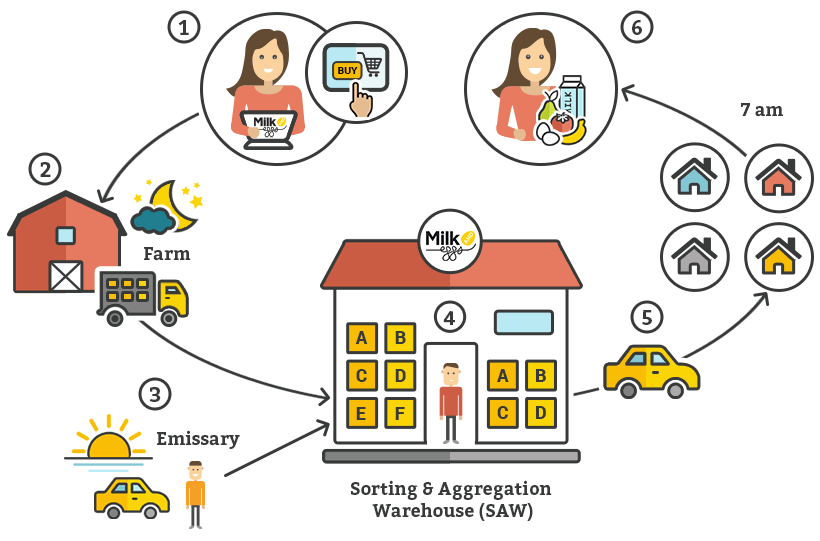Milk & Eggs, a Los Angeles-based online perishable food market and delivery service connecting farmers and artisanal food makers with consumers, has completed a $6 million seed round.
Morningside Venture Capital, an early-stage venture investor out of China, led the funding.
“This now allows us to fund the phenomenal growth that we’ve been experiencing to meet the consumer demand of our services and products,” Kent Wu, founder and CEO of Milk & Eggs, told AgFunderNews. “And it will allow us to continue improving on the experience for our customers.”
Specifically, Wu noted the money will be utilized by Milk & Eggs to improve operations, customer experience and associated technology as it looks to expand and invest on both front-end and back-end operations.
Originally launched in 2016 with a $500,000 initial investment by Wu and his partner Ash Chan, Milk & Eggs currently provides customers in the greater Los Angeles area with fresh, high-quality, locally acquired dairy, eggs, meats, fish, freshly baked goods, vegetables and fruits on a weekly or bi-weekly basis.
“The inception of the company started when my wife and I had our second baby four years ago,” Wu explained. “After having been in eCommerce for 15 years, in an effort to help out, I bought diapers, baby clothing and a TV all online. But then was astounded and dumbfounded that there were no options for food.”
He sold his company and spent the next two subsequent years formulating a business model that fulfilled three things: was unique enough that it didn’t compete with WalMart/Kroger head-on; had a significant value proposition to both customers and farmers; and was more cost-effective and convenient over the current model.
“It’s a fully realized evolution and disruption of the supply chain that is similar to models in Europe and Asia,” Wu said. “In those countries, which have double to triple the online grocery adoption, food is made and farmed locally. Pastries are bought from the local pastry shop, not a Goliath store that has low quality or a pastry factory hundreds of miles away with 2-3 day old food.”
While general competitors are stores like Walmart, Kroger, Whole Foods, and online delivery services like Instacart and Amazon Fresh, Milk & Eggs is different because what’s purchased is made-to-order. The simplest way to put it is, Milk & Eggs is an online farmer’s market that delivers; it’s like it’s providing people with their own personal farmer, says Wu.
“That carrot that you’re ordering is still in the ground at the farm,” Wu said. “The bread that is being delivered hasn’t been baked yet. Everything is to order. After an order is placed, the farmer harvests or makes the food for the customer.”
The funding round, which closed the first week of September, was put together quickly and Wu and Chan both participated in this round as well. Morningside Venture Capital has a long history of investing in container urban farming and other health and biotech companies.
“They have a wealth of expertise in health, bio, and technology. Ag Tech is a small subset of their portfolio, but we’re confident their experience will translate to our sector and operations,” Wu said. “We were very fortunate that this process was rather speedy and Morningside appreciated and understand the capability of our model. They really get our vision and the true opportunity here that is in front of us.”
Wu admitted there was some initial difficulty convincing investors that the model’s economics and efficiency was not just a calculation, and he’s proud and excited that the company was able to deliver and demonstrate operations and customer retention metrics that were promised.
“Our logistics and delivery model has been on a new paradigm accomplishing numbers that, to date, have been broken the pre-conception of ‘last-mile delivery’” he said. “We did almost a full custom stack on the back and middle end to integrate both operations and our vendors with our front end.”
Looking ahead, Wu envisions continuing to march forward, disrupting and proving what was thought to be a dream and not possible.
“We will be going back to operations and hitting our benchmarks for Series A investors,” he said.





